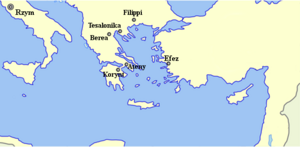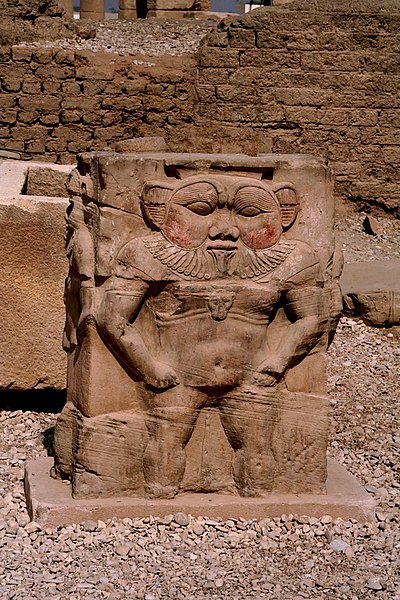| English: The map of First Epistle to the Thessalonians Polski: Mapa miejsc związanych z 1 Listem do Tesaloniczan (Photo credit: Wikipedia) |
The
study of 1 Thessalonians offered here is in the form of a traditional
commentary, although secondary scholarship is engaged more intermittently than
would be the case in a commentary published in a regular print series. This is
the sixth entry in the online commentary on 1 Thessalonians. In the first
entry
I began by looking at introductory matters, comprised of comments on the nature
of a Greco-Roman letter and the background of Paul’s activity in Thessalonica, which
we know primarily from Acts of the Apostles and partially from Paul’s letters. In the second entry, I gave a basic
overview of the content found in the whole letter and then discussed the very
short salutation. In the third entry, I discussed
the Thanksgiving for the letter. In the
fourth post, I started to discuss the Body of the Letter, particularly the parental
affection Paul, Silvanus and Timothy have for the church in Thessalonica, which
was continued in the
fifth post in the series. The sixth entry in the online commentary
continues to examine the love Paul, Silvanus and Timothy have for the
community, which is expressed to some degree as anxiety for the Thessalonian
Christians they had to leave behind when they were forced to leave the city. Please
do follow the links above to see my definition of a Greco-Roman letter, how I
have divided this letter in particular and to catch up on the previous entries
in general.
4.
Paul’s First Letter to the Thessalonians:
c) Body of the Letter: Affection and Anxiety: “We could bear it no longer”
(3:1-13):
1 Therefore when
we could bear it no longer, we decided to be left alone in Athens; 2 and we
sent Timothy, our brother and co-worker for God in proclaiming the gospel of
Christ, to strengthen and encourage you for the sake of your faith, 3 so that
no one would be shaken by these persecutions. Indeed, you yourselves know that
this is what we are destined for. 4 In fact, when we were with you, we told you
beforehand that we were to suffer persecution; so it turned out, as you know. 5
For this reason, when I could bear it no longer, I sent to find out about your
faith; I was afraid that somehow the tempter had tempted you and that our labor
had been in vain. 6 But Timothy has just now come to us from you, and has
brought us the good news of your faith and love. He has told us also that you
always remember us kindly and long to see us—just as we long to see you. 7 For
this reason, brothers and sisters, during all our distress and
persecution we have been encouraged about you through your faith. 8 For we now
live, if you continue to stand firm in the Lord. 9 How can we thank God enough
for you in return for all the joy that we feel before our God because of you? 10
Night and day we pray most earnestly that we may see you face to face and
restore whatever is lacking in your faith. 11 Now may our God and Father
himself and our Lord Jesus direct our way to you. 12 And may the Lord make you
increase and abound in love for one another and for all, just as we abound in
love for you. 13 And may he so strengthen your hearts in holiness that you may
be blameless before our God and Father at the coming of our Lord Jesus with all
his saints. (NRSV)
If,
for Paul, Timothy and Silvanus, the Thessalonian Christians are “our hope or
joy or crown of boasting before our Lord Jesus at his coming” (2:19) and “our glory
and joy” (2:20), their spiritual children, how do they deal with separation
from their children? In chapter three, we find them working out the emotional
and spiritual implications of being torn from their family members, especially difficult
since they are separated from their spiritual children, who need the guidance
of their spiritual parents. We can speak of Paul, Silvanus and Timothy
experiencing anxiety, since they describe the separation as creating unbearable
feelings of loss. In 3:1-3, they write, “when we could bear it no longer, we
decided to be left alone in Athens; and we sent Timothy, our brother and
co-worker for God in proclaiming the gospel of Christ, to strengthen and
encourage you for the sake of your faith, so that no one would be shaken by
these persecutions.” Timothy was sent not only to strengthen the faith of the church,
but to make certain that they could maintain their faith in light of
persecution. Indeed, later in this chapter, Paul alone writes, rare in this letter
to this point, saying, “For this reason, when I could bear it no longer, I sent
to find out about your faith; I was afraid that somehow the tempter had tempted
you and that our labor had been in vain” (3:5).
The
anxiety is centered on whether the spiritual children of Paul, who asserts
himself in 3:5 as the main parental figure, Silvanus and Timothy, will remain
faithful to the Christian teaching and life in the midst of persecution. As
much as they stress that “you yourselves know that this {persecution} is what
we are destined for” (3:3), and “when we were with you, we told you beforehand
that we were to suffer persecution; so it turned out, as you know” (3:4), they
are not convinced that these newly minted Christians can withstand the
pressure. And they have good reason for concern: persecution is always easier
to speak of in the abstract, to prepare for theoretically than to face it in
the flesh. It is not that Paul, Silvanus and Timothy have not experienced
persecution – they have – it is that they have grown and developed maturity in
the faith. The Thessalonians have not had this opportunity to advance in the
faith. As Paul himself says, placing the battles in the spiritual and
apocalyptic realm, “I was afraid that somehow the tempter had tempted you”
(3:5).
The
second half of this chapter, however, shows a turn in the emotional state of
Paul and Silvanus, since “Timothy has just now come to us from you, and has
brought us the good news of your faith and love. He has told us also that you
always remember us kindly and long to see us—just as we long to see you” (3:6).
One of the joys of Paul’s letters is the human reality they evoke of actual
events, encounters, successes and problems that ordinary people in the ancient
world experienced. These are not missives from the academy or the bureaucracy;
these letters are examples of on the ground practical, pastoral theology, whose
laboratory is the world and its joys and tribulations.
It
is the pastors, the parents, who now speak of their encouragement in their own “distress and persecution”
(3:7). My sense is that they did not want to mention their own travails until they
had found out from Timothy, as they do in the course of the actual writing of
this letter, that the Thessalonians were okay. When they do find out that the Thessalonians
have remained faithful, they take a figurative breath and return to the themes
at the end of chapter two: “For we now live, if you continue to stand firm
in the Lord” (3:8). Paul, Silvanus and Timothy have as their goal the spiritual
well-being of their children. The chapter comes to an end with a glorious prayer,
which makes manifest how much their own joy is dependent upon the growth of
their children. “How can we thank God enough for you in return for all the joy
that we feel before our God because of you? Night and day we pray most
earnestly that we may see you face to face and restore whatever is lacking in
your faith” (3:10). Anyone who has a child, physical or spiritual, will
understand the sentiment, a basic desire to see one’s children thrive and the
need to be present with them whenever they face danger, spiritual, emotional or
physical, to guide and guard them. They need to see their children!
Paul,
Silvanus and Timothy end the chapter with what some scholars have suggested
might initially have been intended as the end of the letter itself. This might
be possible, and we will consider it in the context of the transition to
chapter 4 next entry. For the time being, we ought to note that the end of the prayer,
which entrusts them to the care of God, is the thankful outpouring of happy
parents, now at ease. “Now may our God and Father himself and our Lord Jesus
direct our way to you. And may the Lord make you increase and abound in love
for one another and for all, just as we abound in love for you. And may he so
strengthen your hearts in holiness that you may be blameless before our God and
Father at the coming of our Lord Jesus with all his saints” (3:11-13).
Just
like parents, however, a couple of new themes are introduced in these final verses.
Now that they know their children are fine, the parents want to focus on their
maturity and behavior. It is in this context that we ought to see the twofold
use of holy in these verses, namely, “strengthen your hearts in holiness” and “with
all his saints” (3:13). The words holy, holiness, sanctification, and saints in
Greek all have the same root, hagios and
cognates, and Paul and his co-workers are going to return to this theme in the rest
of the letter. Related to this is the call to be “blameless” (amemptos), which is closely related to
holiness and appears in a number of Paul’s letters.
Next
entry, Paul, Silvanus and Timothy encourage the Thessalonians with respect to
their behavior.
John
W. Martens
I invite you to
follow me on Twitter @Biblejunkies







